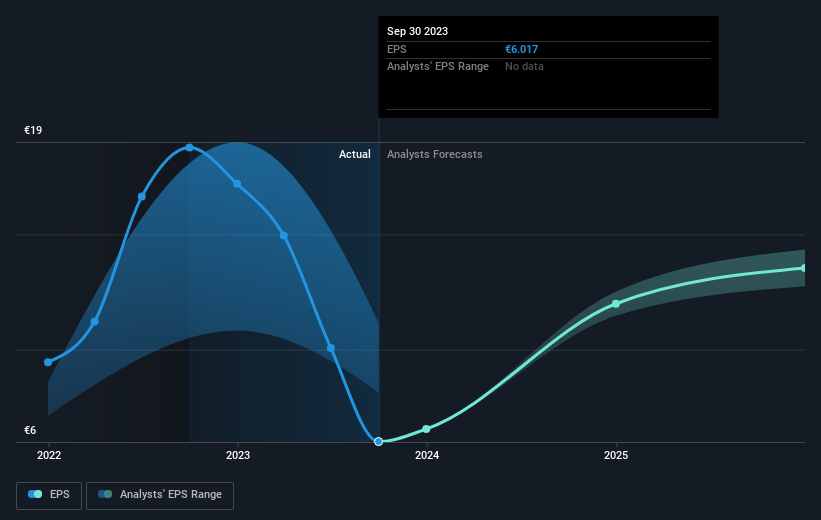Stock Analysis
Investors in Mayr-Melnhof Karton (VIE:MMK) have unfortunately lost 28% over the last three years

In order to justify the effort of selecting individual stocks, it's worth striving to beat the returns from a market index fund. But in any portfolio, there are likely to be some stocks that fall short of that benchmark. We regret to report that long term Mayr-Melnhof Karton AG (VIE:MMK) shareholders have had that experience, with the share price dropping 33% in three years, versus a market return of about 11%. And more recent buyers are having a tough time too, with a drop of 27% in the last year.
So let's have a look and see if the longer term performance of the company has been in line with the underlying business' progress.
Check out our latest analysis for Mayr-Melnhof Karton
To quote Buffett, 'Ships will sail around the world but the Flat Earth Society will flourish. There will continue to be wide discrepancies between price and value in the marketplace...' One flawed but reasonable way to assess how sentiment around a company has changed is to compare the earnings per share (EPS) with the share price.
Mayr-Melnhof Karton saw its EPS decline at a compound rate of 9.0% per year, over the last three years. The share price decline of 13% is actually steeper than the EPS slippage. So it's likely that the EPS decline has disappointed the market, leaving investors hesitant to buy.
The graphic below depicts how EPS has changed over time (unveil the exact values by clicking on the image).

Dive deeper into Mayr-Melnhof Karton's key metrics by checking this interactive graph of Mayr-Melnhof Karton's earnings, revenue and cash flow.
What About Dividends?
It is important to consider the total shareholder return, as well as the share price return, for any given stock. The TSR is a return calculation that accounts for the value of cash dividends (assuming that any dividend received was reinvested) and the calculated value of any discounted capital raisings and spin-offs. Arguably, the TSR gives a more comprehensive picture of the return generated by a stock. As it happens, Mayr-Melnhof Karton's TSR for the last 3 years was -28%, which exceeds the share price return mentioned earlier. This is largely a result of its dividend payments!
A Different Perspective
We regret to report that Mayr-Melnhof Karton shareholders are down 24% for the year (even including dividends). Unfortunately, that's worse than the broader market decline of 3.6%. However, it could simply be that the share price has been impacted by broader market jitters. It might be worth keeping an eye on the fundamentals, in case there's a good opportunity. On the bright side, long term shareholders have made money, with a gain of 2% per year over half a decade. It could be that the recent sell-off is an opportunity, so it may be worth checking the fundamental data for signs of a long term growth trend. It's always interesting to track share price performance over the longer term. But to understand Mayr-Melnhof Karton better, we need to consider many other factors. Even so, be aware that Mayr-Melnhof Karton is showing 3 warning signs in our investment analysis , you should know about...
If you are like me, then you will not want to miss this free list of growing companies that insiders are buying.
Please note, the market returns quoted in this article reflect the market weighted average returns of stocks that currently trade on Austrian exchanges.
Valuation is complex, but we're helping make it simple.
Find out whether Mayr-Melnhof Karton is potentially over or undervalued by checking out our comprehensive analysis, which includes fair value estimates, risks and warnings, dividends, insider transactions and financial health.
View the Free AnalysisHave feedback on this article? Concerned about the content? Get in touch with us directly. Alternatively, email editorial-team (at) simplywallst.com.
This article by Simply Wall St is general in nature. We provide commentary based on historical data and analyst forecasts only using an unbiased methodology and our articles are not intended to be financial advice. It does not constitute a recommendation to buy or sell any stock, and does not take account of your objectives, or your financial situation. We aim to bring you long-term focused analysis driven by fundamental data. Note that our analysis may not factor in the latest price-sensitive company announcements or qualitative material. Simply Wall St has no position in any stocks mentioned.
About WBAG:MMK
Mayr-Melnhof Karton
Mayr-Melnhof Karton AG manufactures and sells cartonboard and folding cartons in Germany, Austria, and internationally.
Reasonable growth potential and fair value.

